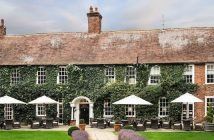Tucked away in the heart of the North Pennines, a 40-minute drive from Durham is The Lord Crewe Arms. Housed in a renovated abbots’ lodge in the centre of the picturesque village of Blanchland, it’s a rural idyll. Philip Larkin used to eat here; as did Benjamin Britten. When WH Auden visited in 1930, he declared that no place held sweeter memories.
Well I can tell you that not much has changed. Winner of the Good Pub Guide’s Inn of the Year 2018, the food and hospitality are still top notch, and we spent two happy days enjoying all it has to offer.
Our stay begins with local gin and tonics in the atmospheric Crypt bar – a vaulted stone room, whose brick walls look like they could tell a story or two – before dinner is served next door in the Bishop’s Dining Room, in front of a roaring fire. Superb toasted almond hummus, crispy ‘dippy egg’ with asparagus soldiers and Portland crab are to start, followed by pan-fried fillets of Loch Fyne Salmon with dressed lentils and Isle of Wight tomatoes. Desserts are bakewell puddings with clotted cream. This is already shaping up to be one of my favourite foodie breaks so far.

Mercifully, the 21 bedrooms are close at hand – spread between neighbouring miners’ cottages and the old abbots’ guesthouse. All rooms are en-suite, with separate rain shower and bathtub, super-comfy beds, Roberts radio, tea and coffee, and a daily supply of yummy homemade fudge and Anzac biscuits.The decor reflects the colours of the nearby forests and moors, and bathroom amenities are by lovely Noble Isle.
The Lord Crewe is close to the river, which is a lovely walk in itself, but further afield you have your pick of more substantial trails. You can borrow Hunter wellies and Barbour jackets from the boot room, then set off in your finery to explore the area. Alnwick Castle – of Harry Potter and Downton Abbey fame – is an hour away. Hadrian’s Wall is also an hour away, and nearby Derwent reservoir is good for sailing and fishing.
Yet more pursuits, such as axe-throwing (which is really taking off, so I’m told), quad biking, clay pigeon shooting and archery, can be arranged through Durham-based company Fury Events, who will come to the hotel and set up in the garden, as they kindly did for us.

After an action-packed day of throwing and shooting various objects around the garden, we’re in for another feast – this time served in the upstairs dining room, looking out over the garden. Around 95% of
the menu here is sourced locally, some from the hotel’s own vegetable garden, and we tuck into veritable spread of home-cured smoked salmon, roasted tomato tart, slices of pork belly and – my personal favourite
– fillet of halibut with ‘whipped tatties’, spinach and caper hollandaise. A bottle of South African chenin goes down a treat. Well, I think we’ve earned it, don’t you?
Built in the 12th century, as part of Blanchland Abbey, the inn used to be the sleeping and dining quarters for the monks of the Northumbrian moors before it become a manor house, then a hotel. It’s full of medieval features – arched windows and flagstone floors, huge stone fireplaces that once roasted pigs, secret staircases, a chimney shaft that hid General Tom Forster during the Jacobite uprising, and former cloisters-now-gardens. An oil painting of Lord Crewe, former Bishop of Durham, after whom the hotel is named, presides over one of the dining rooms.

The following morning, after toasted sourdough with roasted tomatoes and feta – one of the best breakfasts I’ve had in a long time – we take a tour of the village with local guide, Kevin Robson of Wild Dog
Outdoors. To get a sense of the history of Blanchland, we’re led into the church, which used to be the abbey, and told about the founding of the priory in the 12th century, the white-robed monks, and how the village was largely built from the priory remnants.
Blanchland is now designated a Scheduled Monument, which means it’s protected from unauthorised change – a good thing since it’s a rare beauty that could easily be marred by less-than-careful developers. The result is a quintessentially English village that is often used as a film set, with flame-haired Kevin sometimes doubling as an actor/extra himself.

Having worked up yet another appetite, it’s time for a sourdough-making class across the road in the renovated Gatehouse, where cookery demonstrations and food events take place. The Lord Crewe’s head chef Simon Hicks – previously of HIX Soho – talks us through the soughdough process from start to finish – from making a ‘starter’, through to baking the final loaf itself. As the bread here is so delicious, and is freshly baked each day, it’s a treat to learn how its made. We even try our hands at a seeded rye.
All too soon we’re back on the road south, bellies full, lungs rejuvenated. It’s been a good while since I was last in Northumberland, and I’d forgotten how beautiful and rich in history it is. The Lord Crewe is the perfect base for soaking up all it has to offer, and enjoying some excellent British food to boot. I’ll drink to
that.
Stay at the Lord Crewe Arms from £129 per night, based on two sharing and including breakfast. To book visit www.lordcrewearmsblanchland.co.uk or call 01434 677100. For a tour
with Kevin, please visit www.wilddogoutdoors.co.uk.




